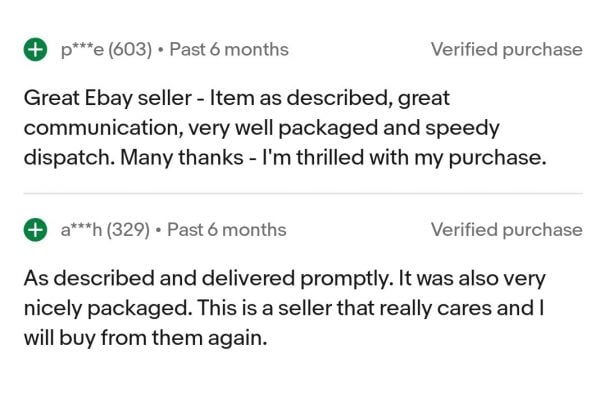Steve Grossberg, president of the Internet Merchants Association, has been having a rant about DSRS, “the star ratings”. Mr Grossberg’s complaint is that the shipping and handling costs criterion is commonly the lowest score amongst a seller’s DSRs, and that “it is totally unfair for a buyer to rate someone on something known in advance with 100% certainty”. I’ve been thinking about this this week as my own S&H rating fell from the heady heights of 4.9 to the gutter of 4.8. In my devastation, I began looking around for an explanation, and what I came up with was this: it’s precisely because buyers know the P&P/S&H charges in advance that they get lower scores.
I have a friend who does free shipping on all their items: their DSR for shipping cost is 4.8. How could you want better than free? How could free possibly be improved upon? You could look at this as “eBay buyers are crazy and even free isn’t good enough for some of themâ€, or you *could* see it as they got free shipping, exactly what they were expecting, no more and no less.
I think that because buyers know the S&H upfront, they never get “a nice surprise†on shipping fees. So it’s going to average out as “as expected†– whereas all the other criteria give the buyer a chance to have a better experience than they’re expecting. That’s why those criteria tend to be higher.
Amongst the rant, however, Mr Grossberg makes an absolutely superb suggestion:
I would rather see ebay replace this DSR with Would you buy from this seller again?
This, frankly, is a stroke of genius. Why bother with all the waffle, because what feedback is supposed to tell you is whether other buyers would recommend the seller. A five point scale (definitely, probably, maybe, probably not, definitely not) would tell you exactly that, without needing to take into account other people’s bizarre expectations about postage charges and dispatch times.
In fact, this one could do what many eBay sellers – some in jest and some not – have suggested: sellers should be able to leave DSRs for buyers too. “Would you deal with this person again?” It would be all the feedback we ever needed.









9 Responses
“Would you buy from this seller again?” almost a stoke of genius yes – but some of the bottom feeders wouldn’t know the difference between ‘would you’ & ‘will you’
perhaps would you recommend this seller to your friends? might be more appropriate (excluding the billy no mates ebayers of course 🙂 )
The not perfect score for even sellers who ship free reflects the uselessness of the system, but people are canny enough to know that even on free shipping the cost is in there somewhere.
My theory is the whole system is a round about way for ebay to get sellers to lower the P&P so the item costs more so they get more fees.
The other 3 categories being there just to pad out and make less conspicuous the P&P rating. I mean seriously its not often a buyer and seller have to communicate on a good transaction.
Effectively the ‘would you buy from this seller again’ could as easily been a simple rate this seller 1-10 in which case why not just plain old pos – neut or neg but would that get ebay more fees?
As usual its probably very well thought out and done for the same reason most things are done 🙁
IMHO as a hair-splitting SOB, there are many reasons for not buying from someone again & customer dissatisfaction is only one of them.
I’ve recently been shopping around for a rice cooker. Once I buy one, I’m not likely to ever need another for quite some time. If I buy one from someone who sells only rice cookers or is selling it as a one-off, then the most honest response would be to select the ‘definately won’t buy from this seller again’ option. Yet the effect on their rating would imply I am dissatisfied with the transaction.
That’s why, with *my* hair-splitting SOB head on, I would word it as WOULD you buy again, not WILL you buy again. Conditional versus future tense. 😀
A better phrasing would be “Would you recommend this seller to others?”
I think the biggest problem with DSRs, and one eBay likely didn’t anticipate, is how much some sellers obsess over them.
The point of them is so that buyers can avoid sellers who take a week to get the item to the post (and don’t disclose that beforehand), or ones that charge massive amounts on shipping and handling and then send it through the cheapest method poorly packaged, or misrepresent the item or take days to respond to emails etc.
The reality though is that some sellers probably check their stars ten times a day, while a low percentage of the buyers might glance at them briefly before making a purchase.
If you have an eBay Store/Shop, I highly recommend taking a look at your most popular pages report. Compare the number of hits your store and items are getting compared to the number of people who even visit your feedback page.
My experience and that of the people I’ve talked to is that it’s usually under 10%. Some percentage of those will even look at the stars, and an even smaller percentage are actually taking the time to mouse over them to see if something is a 4.6 or a 4.7.
I see people in the discussion boards saying “an unfair ding really hurts good sellers” but I think the hurt may really only be emotional, not economic
I think the hurt may really only be emotional, not economic
Spot on, John. *is now worried that the sarcasm about 4.9 -> 4.8 wasn’t obvious enough in the post* 😀
Oh I’ve also seen a seller stop selling internationally for fear of their shipping stars getting dinged.
So in essence, in fear of their rating dropping which maybe might possibly cut out a portion of their sales in the future, they decided to cut out a portion of their sales immediately
Re. international dingage:
Anyone who talked to me last January when this was brought in will know that that was my own big fear. At the time, living in France but with the majority of my customers in the UK, I feared very much that extended delivery times would damage my stars.
As it’s turned out, I think rather the opposite has happened. Because my buyers expect longer delivery times, they’re prepared to allow me longer than UK sellers. I tell them to allow a week, so when it (as it normally does) takes two or three working days, they’re pleasantly surprised.
Manage your buyers’ expectations. Under promise, over deliver. It really works 🙂
The shipping stars bite me a little too. I have a 4.9, 4.9, 4.8, 4.7 rating under my seller ID. I’m in the US and use USPS with whom I try to charge exact fees if using their shipping materials and add about half a dollar for cheaper services using my own materials. I’m convinced the low rating has to do with what the USPS charges, and not what I charge! (The USPS actually raised rates about a month or so before eBay implemented the star system, so even experienced buyers experienced an increase in shipping.)
While I do like “Would you deal with this person again” I think a better idea might be a more general star for shipping –something not explicitly mentioning rates. As an eBay buyer I’d love a star to rate a seller based on his packaging skills. This is the area which I’m most consistently disappointed in as a buyer and could really use a guide to help me decide in advance of purchase whether I want to deal with someone or not.
And while sometimes this could be the postal services fault, I can say for sure that I send out a lot more complaints about receiving damaged goods as a buyer than I receive as a seller, and I can very often spot the poor packaging.
So my suggestion would be a switch from rating “How reasonable were the shipping and handling charges?” to something such as “How satisfied were you with the packing and shipping of this item?”
Thanks for the post!
It is true that buyers should know the shipping costs beforehand.
When sellers are honest and upfront, this is no problem, of course. It is silly to have buyers rate sellers on something they already knew before purchasing an item.
However, there have been two instances where I bought something on Ebay and the seller changed the shipping costs AFTER I purchased the item. In both cases, the shipping costs were changed when I was redirected to a third party check-out system.
The first time it happened, the check out system added on a $1 insurance fee which was not stated in the auction. Furthermore, the item was shipped by UPS, and UPS includes insurance for free for items under $100.
The second time it happened, the shipping cost listed in the shipping area of the auction was completely different from the shipping amount I was charged. Of course, when I bought the item, I entered into a contract to pay the cost listed in the shipping area. Upon check-out, the cost was different.
I’m not against third-party checkout systems, but they do seem to give the seller the ability to charge a different shipping amount than stated. This is a problem that needs to be resolved.
Probably, the reason Ebay does ask for buyers to rate sellers on shipping and handling cost is because it gives them an easy way to catch sellers who are being dishonest. Hopefully, this rating does not hurt sellers who are honest and set reasonable shipping costs. I’m sorry if it does hurt honest sellers 🙁